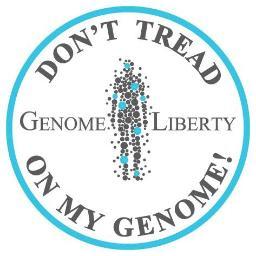Physicians from Hippocrates to today live by the words “do no harm.” Yet in giving prescription drugs to a patient to help alleviate a medical ailment they may indeed be creating unforeseen harmful consequences. That’s because we humans metabolize drugs at different rates and an average dose based on the drug manufacturer’s recommendations may be quite lethal to some of us.
In this age of patient-centered medicine two researchers, Jeffrey Rosenfeld (seen in the image below on the right) and Christopher Mason (to his left) have launched a project, called Genome Liberty, to democratize the genome. What does that mean? They have created a DNA test that identifies how each of us metabolizes commonly prescribed medications. This is a test we can take with us when we go to see our doctor. And since most doctors will readily admit that they don’t understand everything about DNA and drug interactions, represents a breakthrough in medicine of enormous importance.
Doctors have known for years that not all of us respond to prescription medication the same way. I, for one, have problems with morphine. My body just cannot tolerate it. Why? Because I lack the protein vital to instructing my liver enzymes to metabolize the drug.
You see the human body is filled with proteins. Genes use proteins to instruct the body to react to the environment. When you take a prescription medication the gene acts like the bits and bytes in a computer program releasing a chemical set of instructions which in computer vernacular is formatted into proteins. The proteins then circulate through the network that is our body and when the right address is found deliver information to instruct the body to react.
Rosenfeld and Mason have created the Gene-Drug Interaction Test. The test identifies whether you have the appropriate proteins to allow your body to metabolize any of the following commonly prescribed medications:
Abilify
Celexa
Codeine
Coumadin
Dilantin
Estrogen
Haloperidol
Nexium
Plavix
Prilosec
Zocor
What’s involved? You go online, order and pay $99 for your own Gene-Drug Interaction Test. Genome Liberty sends you by mail a saliva collection kit. You follow the instructions to provide a saliva sample which you then send by mail to Genome Liberty’s certified medical laboratory. The lab test looks at your DNA for variations in 11 genes responsible for drug metabolism, the genes that trigger the instructions for enzyme secretions in the liver. They are critical to how your body handles as many as 80 different drugs.
Two weeks after submitting the saliva sample, Genome Liberty sends you the results indicating your body’s response to the commonly prescribed medications for which it tests. In the final report drug dosage recommendations and cautions are provided. This is information you share with your doctor. You also get it on a wallet card and in a smartphone app.
Rosenfeld and Mason have launched a crowdfunding effort to raise $100,000 to get Genome Liberty to market. The money they get will help them to refine the list of genetic markers they will test for, and will help them to get the resources to manage the administration involved in processing test requests and returning results.
The credentials of these two gentlemen are impeccable. Mason is a professor for the Tri-Institutional M.D./Ph.D. program between Cornell University, Memorial Sloan-Kettering Cancer Center and Rockefeller University. Mason also is an appointee for the Weill Cornell Cancer Center, and a fellow of the Yale Law School examining the legal implications of genomics technologies.
Rosenfeld has a Ph.D. from New York University and is an Assistant Professor at Rutgers New Jersey Medical School. He is also a research associate for the American Museum of Natural History and has been spearheading efforts to sequence the genome of under-studied organisms.
When asked why they have created Genome Liberty, Mason stated, “A better understanding of the genetic basis of health and disease can improve the detection, characterization, and treatment of disease that can improve and lengthen lives.” Rosenfeld adds, “My goal for Genome liberty is to allow individuals to have control over their genetic information and to use it to improve their health decisions.”
You can help democratize the genome by assisting these two to raise the money to fund the project. $10 gets you recognition on the donor page of Genome Liberty’s website as well as honorable mention in Facebook and Twitter. Provide a $25 contribution and you get a car magnet you can proudly display. For $36 you will have two questions about genetics answered personally by Mason or Rosenfeld. Pledge $50 and you get a Genome Liberty T-shirt. $75 gets you a Rosenfeld and Mason autographed poster. And $100 lets you pre-order the Genome-Drug Analysis Test and get your own personal report. To check out all the other categories visit the crowdfunding categories page.










